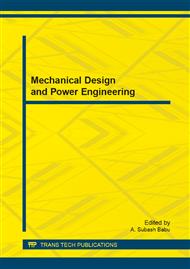[1]
Zhang Zhongjian, Zheng Xiaojuan, Mo Yimin. Method of Train comfortable Grade Measurement and Assessment Based on Virtual Instrument[J]. CHINA WATER TRANSPORT(THEORY EDITION). 2006, 4(8): 141-143.
Google Scholar
[2]
Zhu Jinlong. Test and Analysis of the Cozy Extent of the Overhead Railway Vehicles[J]. URBAN MASS TRANSIT. 2003, 6(2): 46-50.
Google Scholar
[3]
Zhang Jialing, Yi Sirong. Application of Fatigue-Time Method in Selecting Railway Plane Riding Comfort Parameter[J]. RAILWAY STANDARD DESIGN. 2007, (5): 27-29.
Google Scholar
[4]
Peng Xin, Yang Jingyu. Lateral Rigidity Analysis of Long Span Continuous Arch-Truss Composite Steel Bridge[J]. HUNAN COMMUNICATION SCIENCE AND TECHNOLOGY. 2009, 35(1): 91-94, 107.
Google Scholar
[5]
Zheng Zhihong. Testing and Evaluation of Bus Comfort Based on Labview[D]. Nanjing University of Information Science &Technology. (2011).
Google Scholar
[6]
He Qing. Train Optimized Control Based on Genetic Algorithm and Fuzzy Expert System[D]. Southweat Jiaotong University. (2006).
Google Scholar
[7]
Ke Baozhu. The Development of New Sports Fabrics and Establishment of Forecasting Model of Fabric Subjective Thermal Wet Comfort Intelligent. Dong Hua University. (2006).
Google Scholar
[8]
Li Huilin. Research of Online Real-time Optimal Control for Subway ventilation and air conditioning system[D]. Tsinghua University. (1999).
Google Scholar
[9]
Liu Junfeng. Reengineering of General Hospital Medical Center Business Process[D]. Huazhong University of Science and Technology. (2010).
Google Scholar
[10]
Yang Xiaofei. Research and Development of Spatial Management Decision Support System for Wetland Restoration Area in Chongming Island[D]. East China Normal University. (2011).
Google Scholar


